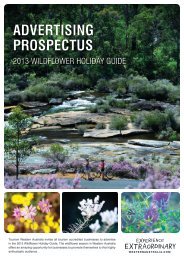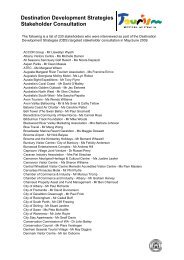A Strategic Approach to the Caravan and Camping Industry 2012
A Strategic Approach to the Caravan and Camping Industry 2012
A Strategic Approach to the Caravan and Camping Industry 2012
You also want an ePaper? Increase the reach of your titles
YUMPU automatically turns print PDFs into web optimized ePapers that Google loves.
each of competitive neutrality principles under National Competition Policy that<br />
government organisations are required <strong>to</strong> follow.” 73<br />
Its key findings are as follows:<br />
“The review of council overnight RV camping services found that councils must adhere<br />
<strong>to</strong> <strong>the</strong> principles of competitive neutrality <strong>and</strong> should apply a full cost attribution<br />
approach when operating <strong>the</strong>se services. Each council-owned service in Tasmania is<br />
highly likely <strong>to</strong> be competing with a privately-owned caravan park, ei<strong>the</strong>r within its<br />
own municipality or in surrounding municipalities, <strong>and</strong> needs <strong>to</strong> price its services <strong>to</strong><br />
reflect costs.<br />
Providing free or low-cost camping services by a council may be a useful short-term<br />
solution <strong>to</strong> some of <strong>the</strong> amenity issues facing councils, for instance <strong>to</strong> prevent RVs<br />
parking <strong>and</strong> camping on <strong>the</strong> side of <strong>the</strong> road <strong>and</strong> <strong>to</strong> attract visi<strong>to</strong>rs <strong>to</strong> <strong>the</strong> area.<br />
However, <strong>the</strong>se measures discourage private caravan parks from investing <strong>and</strong><br />
operating in <strong>the</strong> area <strong>and</strong> reduce <strong>the</strong> benefits from a competitive market. These<br />
benefits include efficient market prices (reflecting <strong>the</strong> costs <strong>to</strong> provide <strong>and</strong> operate<br />
such services), cus<strong>to</strong>mer choice through a wide range of services <strong>and</strong> <strong>the</strong> development<br />
of services that cus<strong>to</strong>mers want, leading <strong>to</strong> economic development. Setting cost<br />
recovery prices will, in <strong>the</strong> long term, enable councils <strong>to</strong> contribute <strong>to</strong> a more<br />
sustainable overnight camping industry <strong>and</strong> promote <strong>the</strong> <strong>to</strong>urism industry in <strong>the</strong> local,<br />
regional <strong>and</strong> State economy.” 74<br />
Best practice methods <strong>to</strong> reduce development <strong>and</strong> operating<br />
costs<br />
There are few references <strong>to</strong> concessions or subsidies offered specifically for caravan<br />
parks <strong>and</strong> campgrounds (outside of <strong>the</strong> general <strong>to</strong>urism grants programs <strong>and</strong> regional<br />
development funds). The main method used <strong>to</strong> manage <strong>the</strong> high development <strong>and</strong><br />
operational costs is for Governments <strong>to</strong> develop caravan <strong>and</strong> camping facilities which<br />
are <strong>the</strong>n leased <strong>to</strong> opera<strong>to</strong>rs with attractive lease arrangements. Outside of this, l<strong>and</strong><br />
tax <strong>and</strong>/or stamp duty concessions appear <strong>to</strong> be <strong>the</strong> only o<strong>the</strong>r concession offered <strong>to</strong><br />
reduce operating costs.<br />
Vic<strong>to</strong>ria<br />
A L<strong>and</strong> tax exemption for caravan parks exists in <strong>the</strong> State of Vic<strong>to</strong>ria<br />
Queensl<strong>and</strong><br />
A partial exempting from L<strong>and</strong> Tax applies for caravan parks in Queensl<strong>and</strong>, but only<br />
where 50 percent or more of <strong>the</strong> sites are allocated <strong>to</strong> residential use, as is <strong>the</strong> case in<br />
New South Wales.<br />
In reviewing <strong>the</strong> current policy, titled Recreational Vehicles - Development <strong>and</strong><br />
Management of Facilities 2008, LGAT <strong>and</strong> <strong>the</strong> Tasmanian State Government found it<br />
no longer appropriate <strong>and</strong> recommended a revised policy which includes cost<br />
recovery requirements <strong>and</strong> address competitive neutrality. The Directions paper<br />
includes a decision-making guide “<strong>to</strong> support open <strong>and</strong> transparent decision-making<br />
on <strong>the</strong> pricing of camping services” 75 <strong>and</strong> a Full Cost Attribution Checklist.<br />
73 Consultation Draft Statewide Directions Paper – Review of Council Recreational Vehicle Overnight camping<br />
Services (Oc<strong>to</strong>ber, 2011)<br />
74 Consultation Draft Statewide Directions Paper – Review of Council Recreational Vehicle Overnight camping<br />
Services (Oc<strong>to</strong>ber, 2011)<br />
75 Consultation Draft Statewide Directions Paper – Review of Council Recreational Vehicle Overnight camping<br />
Services (Oc<strong>to</strong>ber, 2011)<br />
A <strong>Strategic</strong> <strong>Approach</strong> <strong>to</strong> <strong>Caravan</strong> <strong>and</strong> <strong>Camping</strong> Tourism in Western Australia Page 59



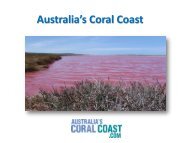
![Annual Report 2002 - 2003 [pdf ] - Tourism Western Australia](https://img.yumpu.com/27124309/1/186x260/annual-report-2002-2003-pdf-tourism-western-australia.jpg?quality=85)
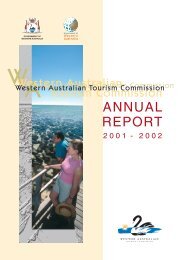
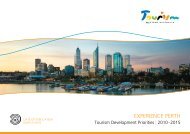
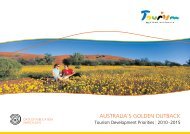
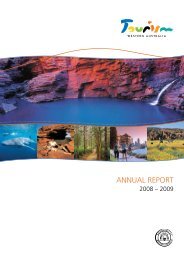
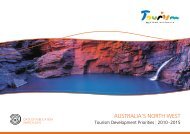

![Our Direction in China 2012 - 2015 [pdf ] - Tourism Western Australia](https://img.yumpu.com/27124271/1/184x260/our-direction-in-china-2012-2015-pdf-tourism-western-australia.jpg?quality=85)
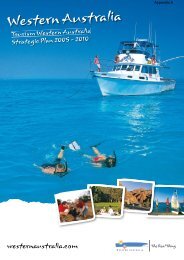

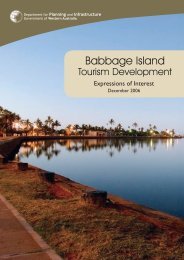
![Naturebank Program 2011 [pdf ] - Tourism Western Australia](https://img.yumpu.com/27124244/1/184x260/naturebank-program-2011-pdf-tourism-western-australia.jpg?quality=85)
